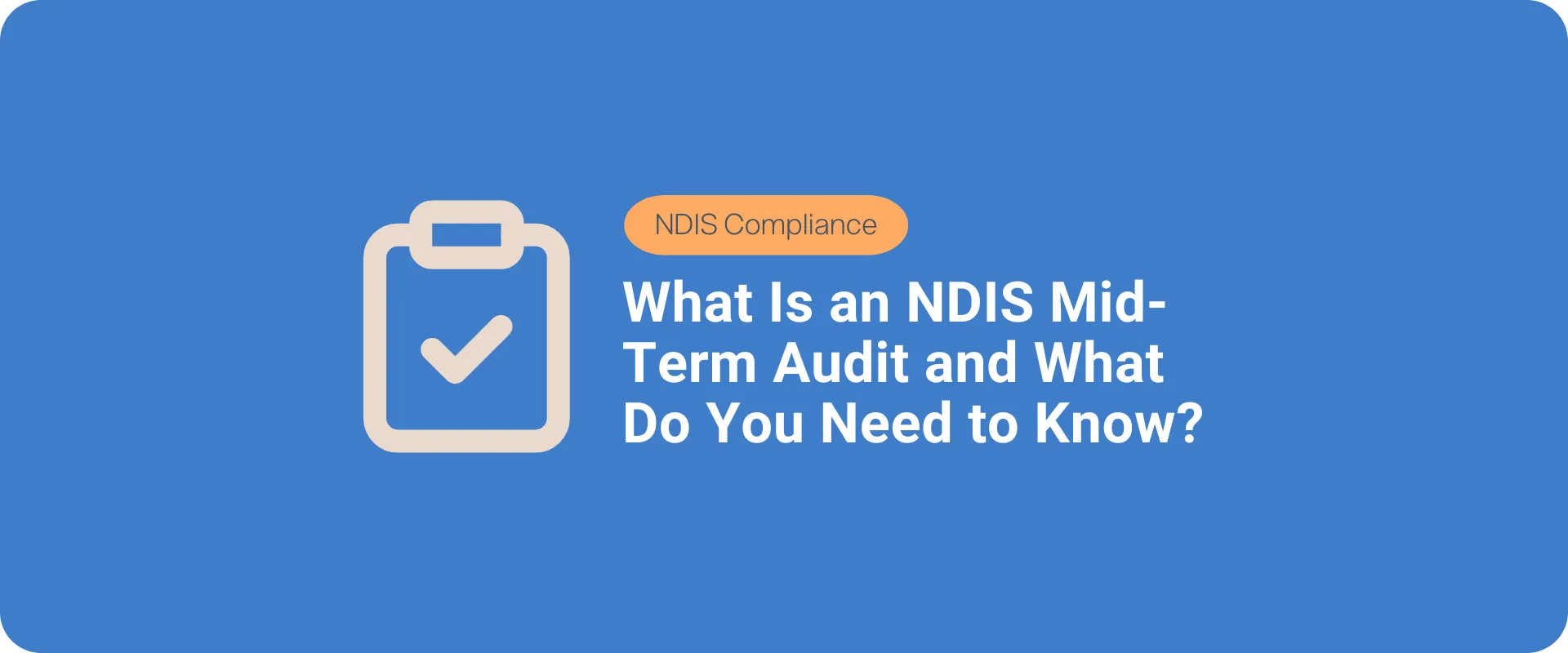What Is an NDIS Mid-Term Audit and What Do You Need to Know?
Summary
The NDIS mid-term audit is a requirement for certified providers to check that you are still operating in line with the NDIS Practice Standards, and is a crucial part of the NDIS Registration Process. It occurs mid registration cycle and must be commenced within 18 months from the date of registration. The process involves document reviews, staff and participant interviews, and a fresh look at whether your everyday practices match your policies and procedures. Whether you’re a sole trader or managing a sprawling support empire, this guide covers what you need to know, what the auditor will be looking for, how to prepare, and what happens if things go a bit pear-shaped.
What is a NDIS Mid-Term Audit and Who Needs to Complete One?
The mid-term audit is a mandatory review required by the NDIS Quality and Safeguards Commission for providers who are delivering certified registration groups.
Not all providers are required to undergo a mid-term audit, and these include:
- Verified providers.
- Providers that are only registered to provide 0131 Specialist disability accommodation.
- Individuals or partnerships registered for only 0118 Early Childhood Intervention.
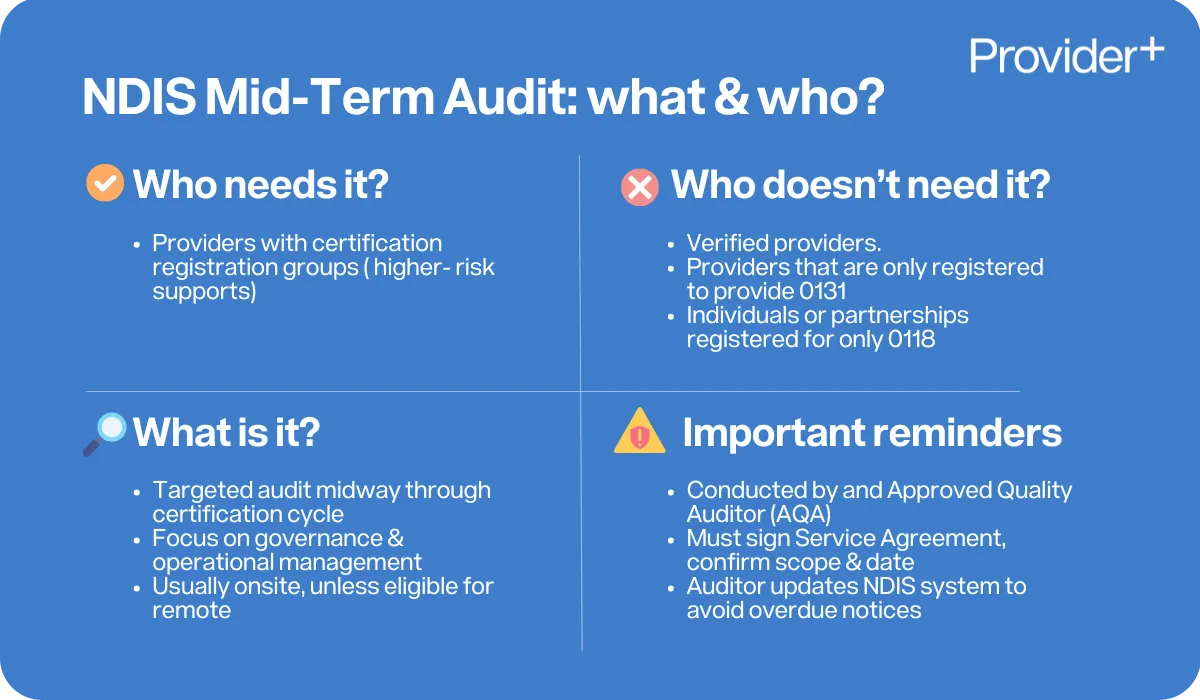
This means if you deliver higher-risk or more complex supports (like personal care, behaviour support, or group accommodation), you will be required to undergo a mid-term audit.
Unlike the initial and renewal NDIS certification audits, the mid-term audit is more targeted. It assesses that a provider has met, and is meeting, the requirements of the Audit Scope for continued registration. The mid-term audit typically zooms in on governance and operational management.
Where a Provisional Audit was conducted initially (where a provider did not have participant present at their initial audit), the NDIS Commission will impose a Condition of Registration to conduct a Remaining Elements of Certification audit with the mid-term audit.
The audit is conducted by an Approved Quality Auditor (AQA), not the Commission itself. The mid-term audit will be conducted onsite, unless the criteria for a remote audit has been met. Ensure you have reached out to your Approved Quality Auditor (AQA) to sign a Service Agreement, confirm the Audit Scope and confirm an audit date. Once the audit date is confirmed, ensure that your AQA updates the NDIS Commission’s system with the audit date to prevent notices being sent from the NDIS Commission for overdue audits.
Failing to complete your mid-term audit can lead to the NDIS Commission revoking you registration. Receiving a major non-conformity rating requires addressing the issue within three months, known as a Corrective Close Out Audit impacting your registration status with the NDIS Commission. It’s not optional, therefore not something to ignore.
The audit findings will be submitted to the NDIS Commission, which will determine your registration status based on the audit outcome.
What Does the Mid-Term Audit Look At?
Your AQA will request certain information from you to determine your audit scope for the mid-term audit.
The mid-term audit scope will include the following elements for review:
- Division 2: Governance and Operational Management
- Participant interviews and file reviews
- Key Personnel, worker interviews and file reviews
- Closure of any open non-conformances / corrective action plans
- Site sampling
- Other audit requirements (referred to below).
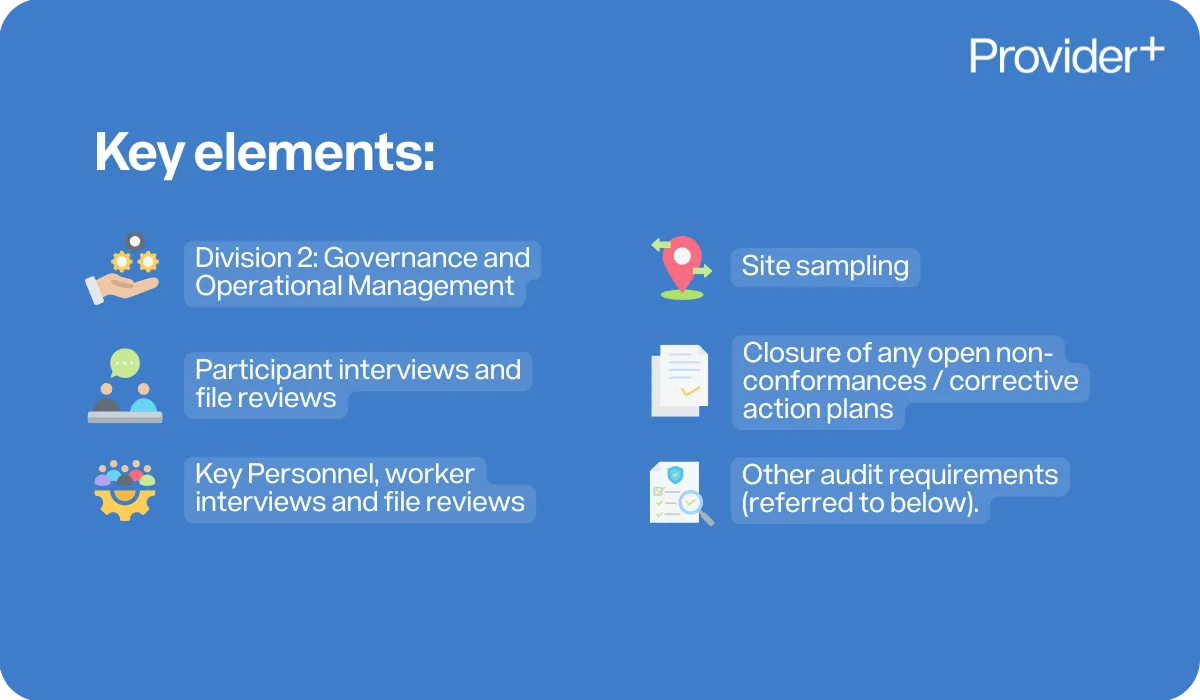
Division 2: Governance and Operational Management includes the following NDIS Practice Standards Quality Indicators:
- Governance
- Risk Management
- Quality Management
- Information Management
- Complaints and Feedback Management
- Incident Management
- Human Resource Management
- Continuity of Supports
- Emergency and Disaster Management.
Your mid-term audit scope may differ for the following reasons:
- If there is a condition of registration imposed by the NDIS Commission for the remaining elements of the certification audit to be completed as a part of the mid-term audit.
- If you are completing a variation to registration application and additional modules are required to be audited.
- If the NDIS Commissioner requests any standard in a written notice given to the provider.
The Auditor Will:
- Review your policies and procedures (governance, incident management, risk, complaints).
- Examine staff and participant records.
- Conduct interviews with staff and participants (with consent).
- Check if you’re meeting your Core Module obligations.
- Review any Supplementary Modules relevant to your registration (e.g. high-intensity supports, behaviour support).
- Conduct site visits to assess compliance with NDIS Practice Standards.

This isn’t just about having documents. The auditor wants to see that your systems actually work and you are doing what you say you are going to do. Got a risk management plan? Great. Show how you’ve used it.
Most Common Mid-Term Audit Pitfalls (and How to Dodge Them)

For Sole Traders:
- Risk register? Often missing or incomplete.
- No internal audits or review system (“I check things occasionally” doesn’t count).
- Outdated or generic policy templates with no local relevance.
- Lack of ongoing professional development and training for maintaining competency.
For Small Providers:
- Participant files missing signed agreements, risk assessments or progress notes.
- Complaints and incidents not logged or followed up, compromising participant safety.
- Ineffective complaints management processes compromising participant safety and compliance.
- Staff records missing screening checks or training evidence.
For Large Providers:
- Inconsistent business operations across sites.
- Inconsistent service delivery across different sites affecting overall compliance and quality.
- Continuous improvement plans that haven’t been updated since initial registration.
- Restrictive practices used without proper authorisation or reporting.
Supplementary Modules: What You Might Be Audited On
Depending on your registration groups, you might be audited against specific modules:
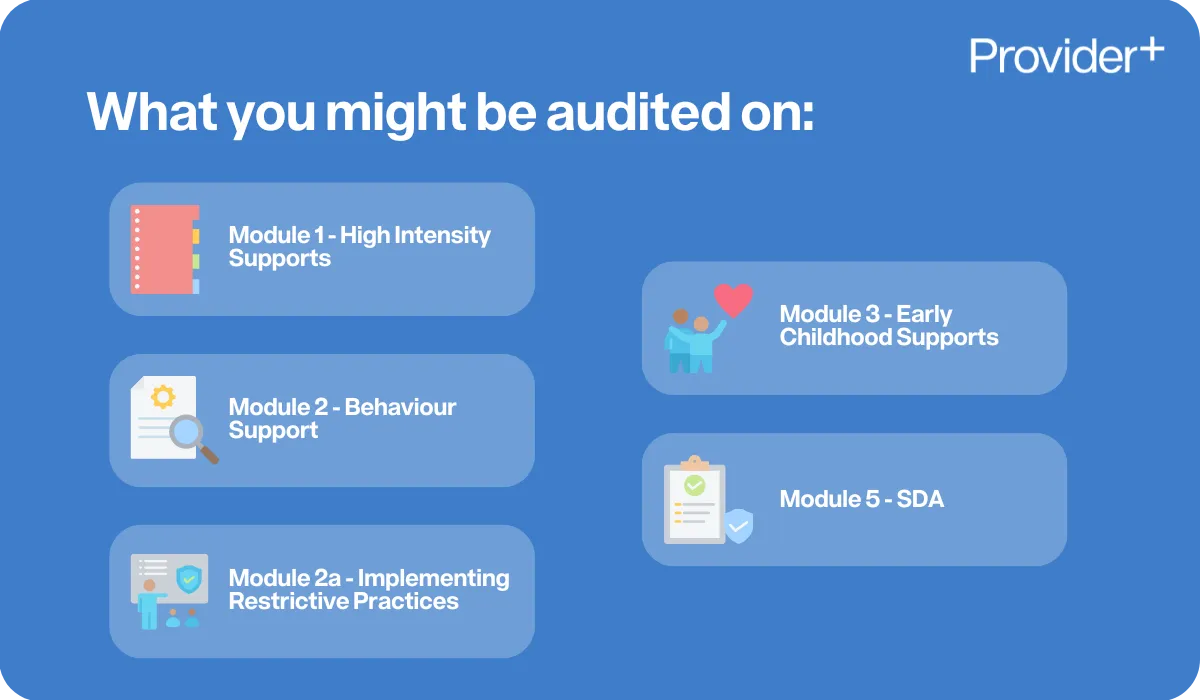
- Module 1 - High Intensity Supports: Staff competencies, training records, clinical oversight.
- Module 2 - Behaviour Support: Evidence of practitioner registration, plan quality, restrictive practice reduction.
- Module 2a - Implementing Restrictive Practices: Authorisation obtained, participant consent, Behaviour Support Practitioner collaboration, worker training, monthly reporting.
- Module 3 - Early Childhood Supports: Family engagement, child-safe practice.
- Module 5 - SDA: Property compliance, tenancy agreements, safety drills.
Compliance with standards set by professional bodies will also be assessed.
Preparing for the Mid-Term Audit: Your Game Plan
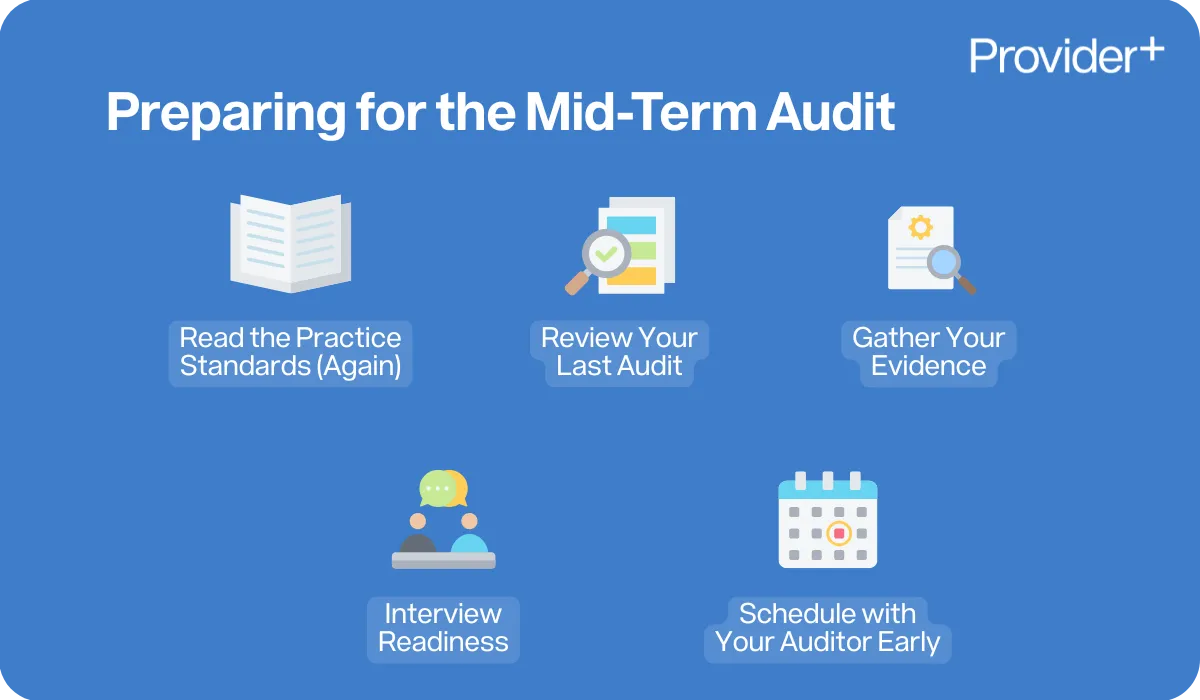
- Read the Practice Standards (Again): Focus on the Core Module Governance and Operational Management and any specific supplementary ones.
- Review Your Last Audit: Were there any non-conformities? Have you addressed them with corrective actions?
- Gather Your Evidence:
- Risk register
- Continuous improvement records
- Incident & complaint logs
- Participant files
- Staff HR records (incl. NDIS Worker Screening, orientation training)
- Ensure all necessary documentation is organised and ready to demonstrate compliance with NDIS Practice Standards.
- Interview Readiness: Brief staff. Let participants know they may be contacted and give them the option to opt out.
- Schedule with Your Auditor Early: Don’t leave this to the last minute, the mid-term audit can be commenced 12 months post your Registration date.
Mid-Term Audit Preparation Checklist
- Update your policies and procedures to reflect current NDIS Practice Standards.
- Complete an internal audit or self-review to assess ongoing compliance.
- Verify staff records are current, including screening checks, training, and qualifications.
- Review participant files to ensure all agreements, risk assessments, and notes are complete.
- Check your incident and complaints registers for accuracy and documented follow-up.
- Refresh your risk register with recent assessments and controls.
- Maintain a continuous improvement log showing recent actions and reviews.
- Document behaviour support practices and restrictive practices, if applicable.
- Brief your staff on key compliance policies and how to respond to auditor questions.
- Notify participants (and their guardians, if applicable) about the potential for interviews and confirm opt out.
- Confirm your auditor booking and complete their pre-audit questionnaire or intake forms.
- Estimate and plan for audit costs to ensure you have the necessary budget.
- Complete a final check against the Auditors Audit Plan confirm that your audit preparation has matched the auditors audit plan, fine tune last minute evidence requirements.
Frequently Asked Questions (FAQ)
Do I have to do a mid-term audit if I’m a sole trader? Only if you were certified during registration. If you were verified (usually for low-risk services), you would not be required to as this not part of your audit cycle.
What happens if I miss the mid-term audit deadline? You risk losing your registration. It’s a condition of being an NDIS provider. The Commission can suspend or cancel your registration.
Can I fail the mid-term audit? No. Even if you receive Non-Conformances you will be given time to fix these (unless they’re severe or wilfully ignored). Remember all audit findings, both negative and positive present an opportunity for improvement and adequate preparation is key to a successful audit.
What if a Non-Conformance is raised? A Non-Conformance does not mean that you have failed your audit. The NDIS Practice Standards are built on continuous improvement, and a Non-Conformance represents an opportunity to improve and reduce risk. Your auditor will either raise a minor Non-Conformance or a Major Non-Conformance, which is determined by the evidence you have in place and the level of risk posed to your business and to your participants. You will be required to complete a Corrective Action Plan and return this to your auditor within 7 days for their review and acceptance. Your auditor will then let you know how long you have to close out the Non-Conformance (3 months for a Major Non-Conformance and 18 months for a minor Non-Conformance).
What if I have no participants yet? If you have not yet commenced active service delivery, you are still required to complete a mid-term audit as a requirement of your NDIS Registration. Your Auditor should provide you with a Service Agreement and an Audit Scope that reflects your current situation (this will be proportionate to reflect no active service delivery).
What if I want to add Registration Groups during my Mid-Term audit? If you are wanting to add additional registration groups and/or specialist modules to your registration, ensure you have informed your AQA to have these included in your Audit Scope. You will also need to complete an Application for Variation of Registration form and provide this to the NDIS Commission.
Who pays for the audit? You do. It’s part of being a registered provider. Costs vary depending on your provider size and scope. It is recommended to contact multiple Auditors to find one that fits in with your budget and aligns with your organisation.
How long does the audit take? The Audit duration can vary and this is dependent on your size and services.
Will the auditor visit my site? Yes, there is a requirement for audits to be conducted on-site (even if you operate from a home office).
How does the mid-term audit impact NDIS participants? Ensuring compliance with NDIS Practice Standards during the mid-term audit helps maintain high-quality support and services for NDIS participants.
Final Thoughts
The mid-term audit isn’t there to catch you out. It’s a temperature check to make sure what’s on paper matches what’s happening in practice. Done right, it can even be a moment to reflect and improve. NDIS approved quality auditors play a crucial role in ensuring that your practices align with the NDIS Practice Standards. The NDIS Commissioner plays a crucial role in evaluating compliance and ensuring quality support for NDIS participants.
References:
- NDIS Quality and Safeguards Commission. (n.d.). Types of audits. Retrieved May 16, 2025, from https://www.ndiscommission.gov.au/provider-registration/apply-registration/types-audits
- NDIS Quality and Safeguards Commission. (2022). NDIS Practice Standards and Quality Indicators. Retrieved May 16, 2025, from https://www.ndiscommission.gov.au/sites/default/files/2022-02/ndis-practice-standards-and-quality-indicatorsfinal1.pdf
- NDIS Quality and Safeguards Commission. (n.d.). Provider obligations. Retrieved May 16, 2025, from https://www.ndiscommission.gov.au/provider-pack
- NDIS Quality and Safeguards Commission. (n.d.). Rules for behaviour support and restrictive practices. Retrieved May 16, 2025, from https://www.ndiscommission.gov.au/rules-and-standards/behaviour-support-and-restrictive-practices/rules-behaviour-support-and
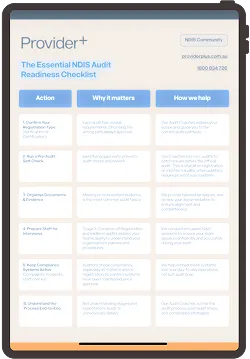
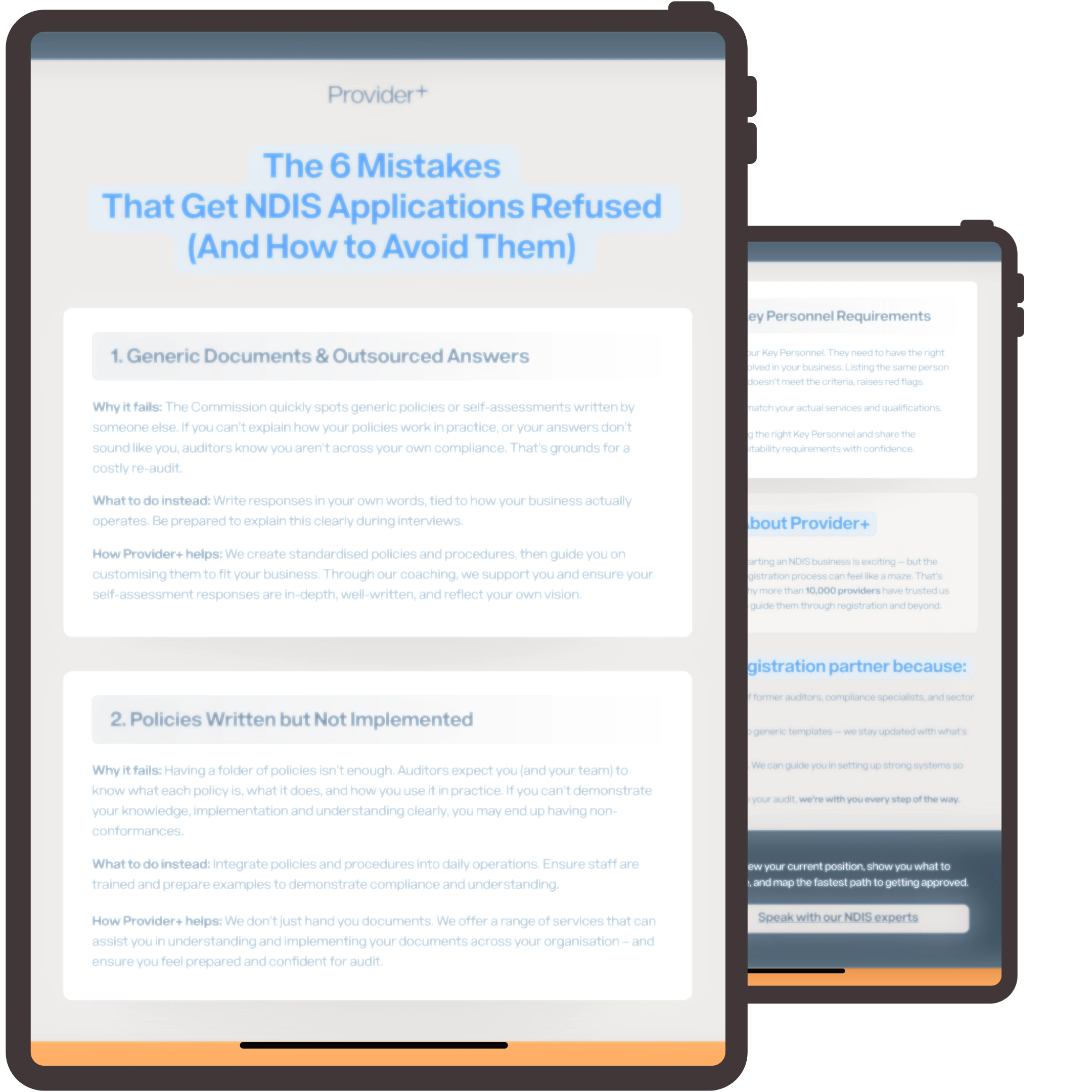
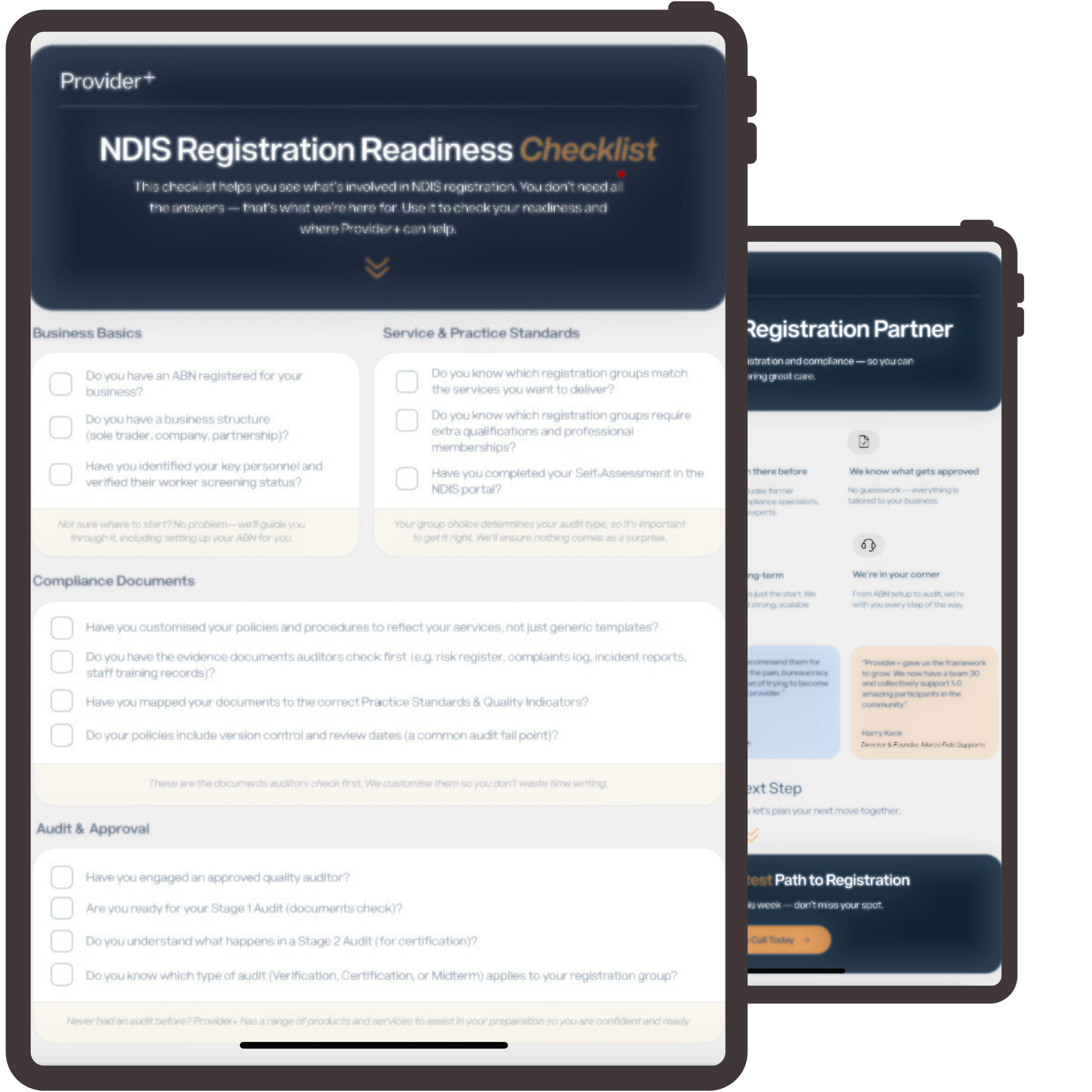

































FAQs
Here is our frequently asked questions.

